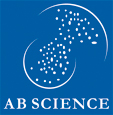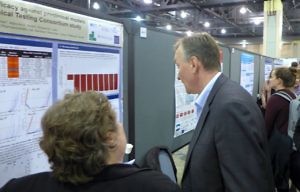AB Science confirms the filing for the Marketing Authorization Application to the European Medicines Agency of Masitinib in the treatment of Pancreatic Cancer.
 Paris based biopharmaceutical company AB Science announced in an October 16 news release that the company has applied to the European Medicines Agency (EMA) for approval of masitinib in pancreatic cancer.
Paris based biopharmaceutical company AB Science announced in an October 16 news release that the company has applied to the European Medicines Agency (EMA) for approval of masitinib in pancreatic cancer.
Masitinib is a tyrosine kinase inhibitor of PDGF, PDGFR, FGFR, FAK, c-KIT. A phase 3 clinical trial (NCT00789633) in pancreatic cancer is underway that compares masitinib with gemcitabine to placebo with gemcitabine. The trial started in November 2008 with an estimated enrollment of 320 patients at 68 study locations. As far as I am aware no data has yet been presented for this trial.
The phase 2 trial results for mastinib in pancreatic cancer were, however, extremely promising.
Strangely, the AB Science news release today offers no top line results, and merely states the “communication of results was delayed to allow the filing for patent applications aimed at extending the period of marketing exclusivity.”
The presumption from the filing and today’s announcement is that the data for mastinib in pancreatic cancer is positive, which is good news for patients. I look forward to hearing more about the overall survival benefit for masitinib when more data becomes available.
This news also adds to the excitement building in pancreatic cancer, with the Celgene Abraxane data expected before year end.
Update November 1, 2012: Phase 3 Trial Results Announced
In an October 30, 2012 news release, AB Science finally shared the data for their Phase 3 clinical trial (NCT00789633): A Study to Compare Efficacy and Safety of Masitinib in Combination With Gemcitabine, to Placebo in Combination With Gemcitabine, in Treatment of Patients With Advanced/Metastatic Pancreatic Cancer.
I don’t plan to rehash the self-explanatory news release, but the results are mixed. The Principal Investigator, and leading pancreatic cancer experts I contacted (who were not involved with the trial) did not respond to requests for comment. This suggests that we will have to wait till the data is presented at the ASCO GI symposium in San Francisco next year to fully understand the implications for clinical practice.
Bad news: Study failed to meet it’s primary endpoint of showing that masitinib increased overall survival (patients lived longer) when used in combination with gemcitinabine versus gemcitabine alone.
- Median OS was 7.7 months in the masitinib plus gemcitabine treatment arm versus 7.0 months in the placebo plus gemcitabine treatment arm (p=0.74; hazard ratio=0.90).
The company news release states:
“This finding of a non significant survival improvement in the overall population is explained by the fact that masitinib is not indicated when Gemzar® is highly efficient.”
However, there is some positive news for AB Science, and that is a subset of the 320 patients in the study did significantly live longer with masitinib.
Good news: a subset of pancreatic cancer patients with a novel genetic biomarker for tumor aggressiveness, identified using RNA expression from whole blood samples, lived significantly longer with masitinb.
- Patients in the subset with this biomarker (65% of the study population) had a median overall survival (OS) of 5 months on gemcitabine alone, while those on masitinib and gemcitabine had an OS of 11.0 months (hazard ratio of 0.29, p=0.000038).
A survival advantage of 6 months with mastinib is a dramatic result!
If mastinib can be used in conjunction with a predictive biomarker that identifies those patients who may likely respond, it is hard not to imagine that some form of regulatory approval would be forthcoming, despite the failure of the trial to meet it’s primary endpoint. However, more clinical data and another clinical trial may be needed to validate the biomarker, if as it appears, the biomarker was identified retrospectively.
There are also many unanswered questions:
- what is the technology needed to detect the biomarker?
- is this a test that can be routinely performed?
- is there a diagnostic kit available?
- How might such a genetic biomarker be used in clinical practice by non-academic physicians?
- What is the extent to which the biomarker has been shown to be valid and reproducible?
I look forward to hearing more about the masitinib data at the ASCO GI 2013 meeting.
Update November 6, 2012: Skuldtech identified as diagnostics partner
Another piece of the jigsaw has been provided in a November 3 news release from AB Science that french company, Skuldtech is the company they are working with on a companion diagnostic test for masitinib in pancreatic cancer. As usual, I found the news out first on Twitter:
The AB Science news release states that:
Skuldtech and AB Science plan to exploit these new markers for commercialization of a future companion test associated with masitinib, a molecule developed by AB science for treating pancreatic cancer.
It goes on to say:
“From a simple drop of blood, Skuldtech and AB Science were able to identify specific markers – transcriptomic markers – that can distinguish between the different populations treated during the phase III study and select the predictive markers for pancreatic cancer survival associated with masitinib treatment.”
We await further information on the cost, availability and validation of the companion diagnostic.
 In this latest conference preview, we have chosen a dozen key topics of interest that readers may find worth checking out plus an honourable mention for early compounds in development that we may well hear more about going forward.
In this latest conference preview, we have chosen a dozen key topics of interest that readers may find worth checking out plus an honourable mention for early compounds in development that we may well hear more about going forward.





 We saw at ASCO last year that response to checkpoint immunotherapy is feasible in some patients with colorectal cancer, but what about other gastrointestinal tumours such as pancreatic, duodenal and biliary cancers?
We saw at ASCO last year that response to checkpoint immunotherapy is feasible in some patients with colorectal cancer, but what about other gastrointestinal tumours such as pancreatic, duodenal and biliary cancers?